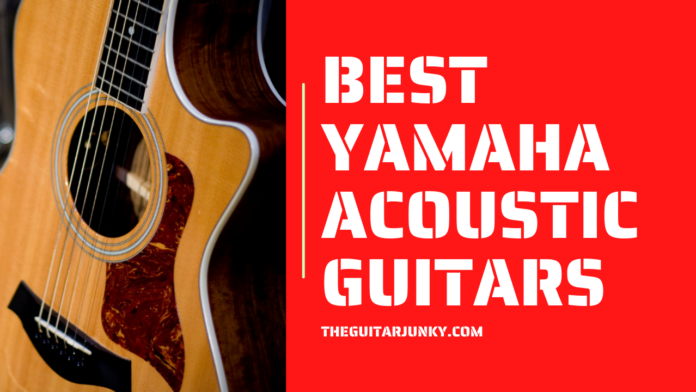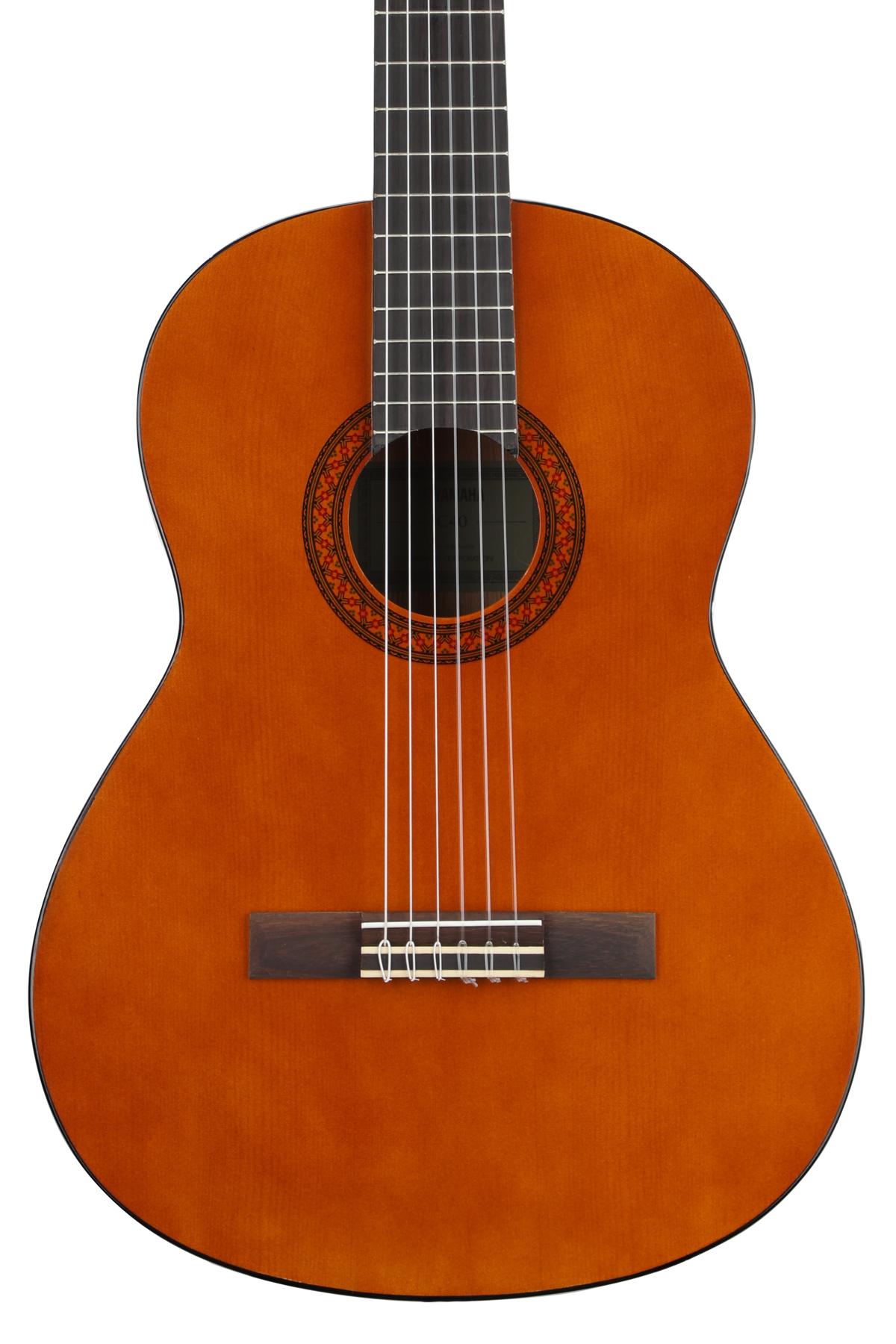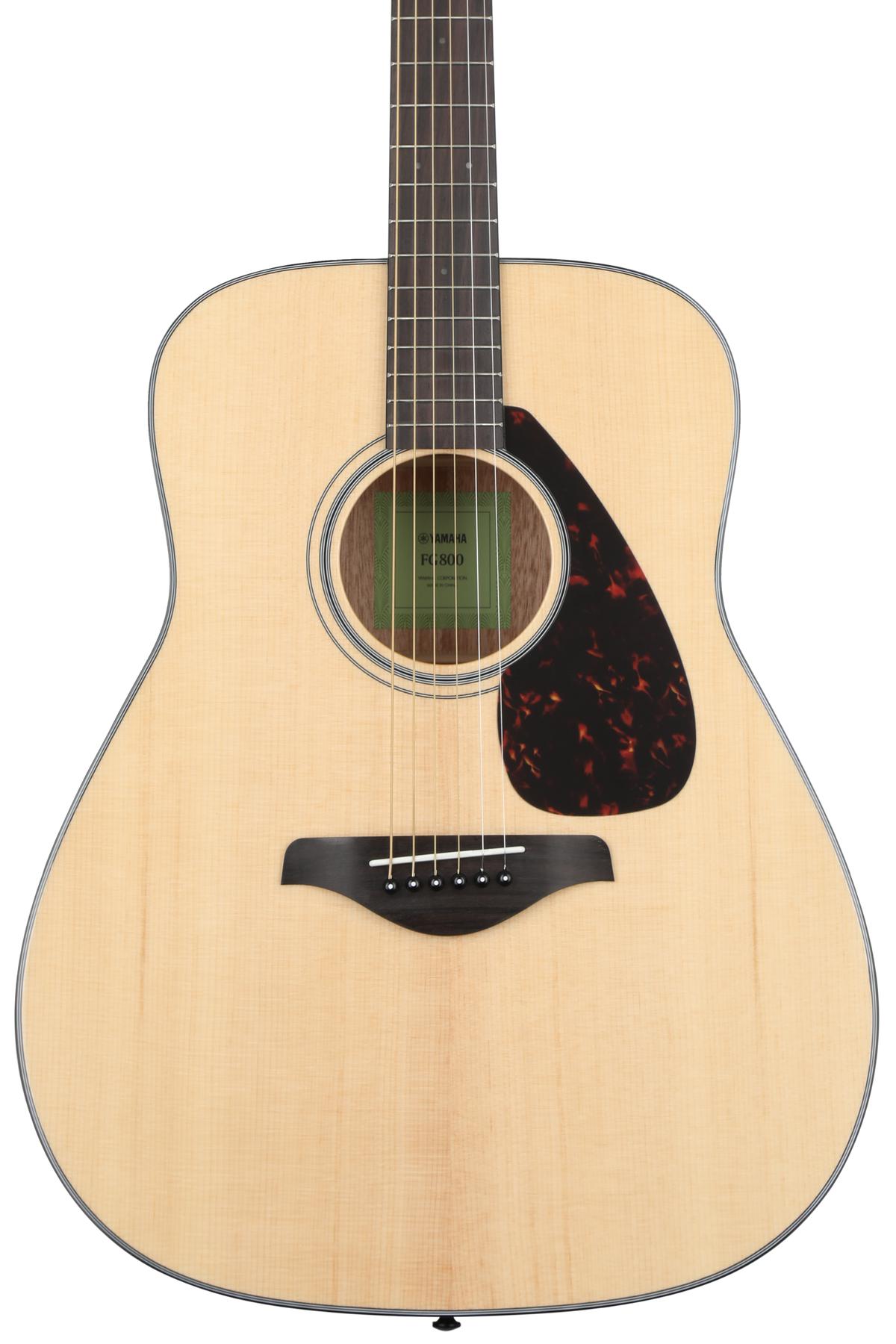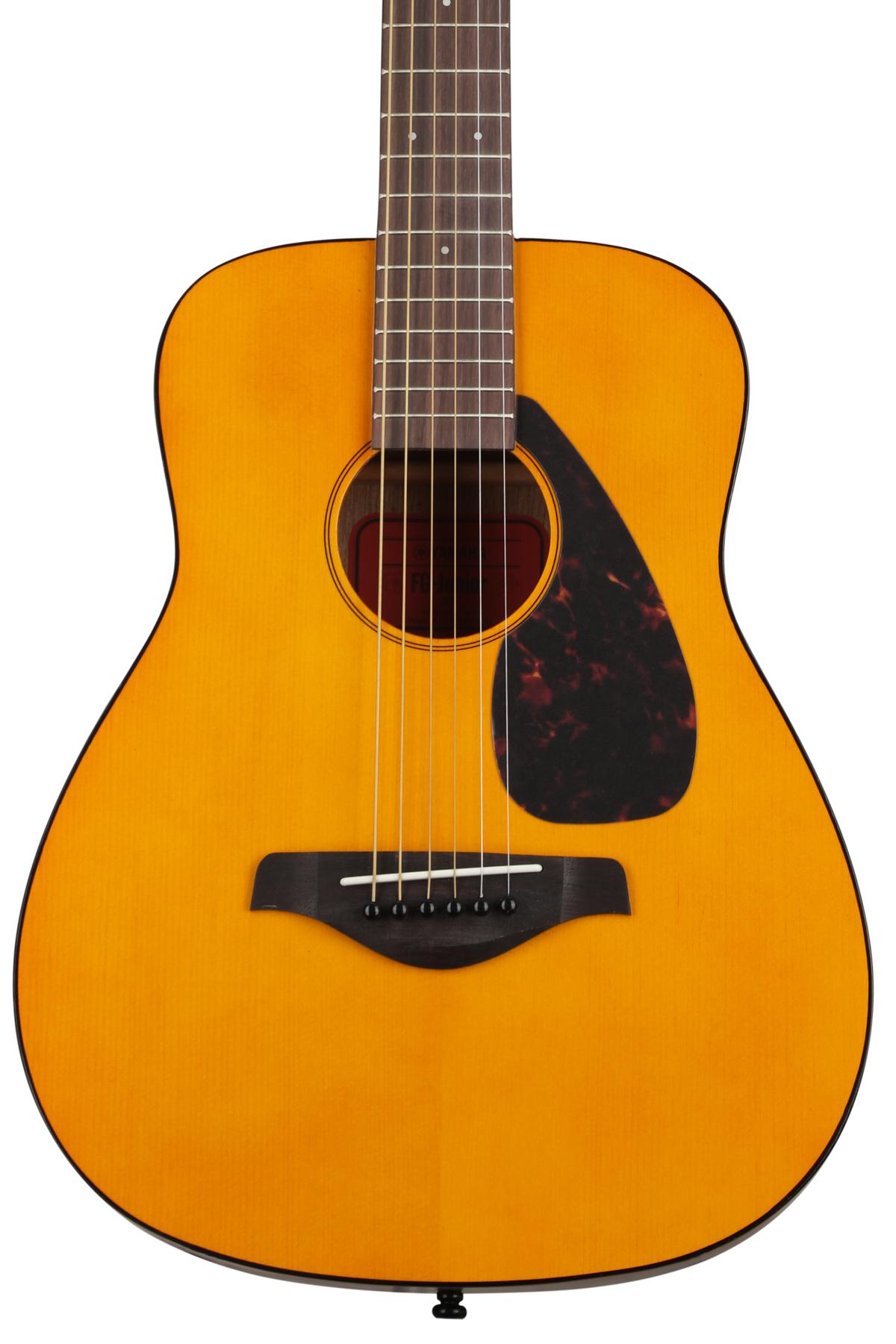Yamaha might not be at the top of your mind when it comes to guitars.
If I am right, you will be thinking about Gibson, Fender, Martin, and Taylor as the undisputed leaders in the guitar industry.
However, this Japanese guitar brand can go head-to-head with the best offerings in the West.
There is a Yamaha guitar for every musician, from absolute beginners to intermediate players and seasoned guitarists, and for different budgets, too.
Today’s Yamaha acoustic guitars feature revolutionary technology, making them sound finely aged musical instruments straight out of the box.
The question now is, which Yamaha acoustic guitar is the best?
As a guitarist with almost two decades of experience, I am offering my take on the ten best Yamaha acoustic guitars.
Of the ten Yamaha acoustic guitars I reviewed, the Yamaha FG800 earned the top spot.
This folk guitar is affordable, has an excellent sound, reliable guitar construction, and a full-bodied, warm tone seasoned guitarists love about dreadnoughts.
Of course, this is my opinion.
That is why I also included an in-depth review of the nine other Yamaha acoustic guitars to help you decide the best musical instrument to bring home.
Let us look at the best Yamaha acoustic guitars, starting with the FG800.
Contents
10 Best Yamaha Acoustic Guitar
- Yamaha FG800 – Best Overall Yamaha Acoustic Guitar
- Yamaha C40II – Best Budget Yamaha Classical Acoustic Guitar
- Yamaha JR 1 – Best Yamaha Acoustic Guitar for Kids and Teens
- Yamaha A3R ARE – Best Yamaha Acoustic-electric Guitar
- Yamaha SLG200S Silent Guitar – Best Yamaha Travel Acoustic-electric Guitar
- Yamaha APXT2 – Best Yamaha Acoustic-Electric Guitar for Kids and Teens
- Yamaha LL16 Jumbo – Best Yamaha 12-string Acoustic-electric Guitar
- Yamaha FG-TA – Best Yamaha Acoustic Guitar for Folk Music
- Yamaha GC82C Classical – Best Splurge-worthy Yamaha Classical Acoustic Guitar
- Yamaha LL56 Custom A.R.E. – Best Premium Yamaha Acoustic Guitar
Also Great | Editor's Choice | Budget Pick |
Yamaha FG800
Yamaha’s FG-series guitars are a favorite of country and folk musicians because of their legendary sound.
The FG800 continues on Yamaha’s commitment to folk guitar design and construction, ensuring guitarists can play lively riffs, sweet-sounding leads, and punchy chords.
This acoustic guitar has a dreadnought body shape, delivering a warm, resonant, and full-bodied tone.
Its design and construction ensures improved projection for different applications, including recording sessions and live performances.
The guitar’s craftsmanship is typical of Japanese attention to detail and precision, using a combination of solid spruce for the top and nato and okoume for the back and sides.
While the FG800 is quite big for some people, it remains a favorite of beginner acoustic players because of its excellent sound, surprising playability, and affordability.
Beginner guitarists can go through the learning process with Yamaha’s ingenious Player Port app they can install on their iOS and Android Games And Apps.
Overall, the FG800 is the best acoustic guitar you can get from the Japanese brand.
It has a stunning look, impressive acoustic characteristics, reliable construction, surprising playability, and an unbeatable value.
Pros
- Great for beginners and professionals alike
- Exceptional tone and resonance
- Reliable guitar construction
- With Player Port app
- Great value
Cons
Hefty for some people
Yamaha C40II
Nylon-string classical guitars produce a soft and mellow sound that can stir the inner Don Quixote in you.
However, the Yamaha C40II is not your ordinary classical guitar.
This musical instrument produces a lively and bright sound, perfect for playing in a mariachi band or Spanish boleros.
Beginner players will love this guitar’s playability, allowing them to learn and master the correct finger positions, transitions, and other fingering techniques.
The solid spruce top, nato neck, and rosewood fingerboard combine to produce a lovely sound few guitars can offer at this price point.
The nylon strings and the rosewood fingerboard promote improved playing comfort.
One can play with the C40II for many hours without feeling strained or stressed.
Yamaha also includes the Player Port software to help novice guitarists blitz through the learning process.
The C40II is also more affordable than other classical guitars, making it an excellent choice for cash-strapped aspiring guitarists.
Although the C40II is an entry-level classical guitar, its outstanding sound characteristics make it a reliable backup guitar for seasoned players.
Pros
- Lively and bright sound
- Ideal for mastering finger techniques
- Affordable
- Comfortable to play
- Player Port app
Cons
- Bland looks
Yamaha JR1
The Yamaha JR1 might have a dwarfish look, but there is nothing small in its tone and sound characteristics.
Like many dreadnoughts, the JR1 still impresses with its booming sound, admirable resonance, and excellent projection, despite missing a quarter of the size of a standard guitar.
Fretting the strings on the fingerboard is a cinch because of its rosewood material.
The soundbox creates a surprisingly warm, full-bodied, and rich tone that you would not believe this guitar is only ¾ size.
The JR1 retains Yamaha’s signature acoustic guitar design, complete with the classic overlay below the soundhole.
Yamaha did not compromise on the guitar’s construction, either.
This acoustic guitar has a solid spruce top, meranti sides and back, and nato neck.
Although the guitar only has 20 frets, its size is more than enough to make the JR1 an excellent choice for young guitarists and players with small hands.
Yamaha not only throws in the Player Port app with each JR1 purchase but also a gig bag for protecting it.
Pros
- Small body, large sound
- Classic guitar design
- Excellent for guitarists with small hands
- High-quality construction
- With gig bag and Player Port app
Cons
- Fragile bridge plate
Yamaha A3R ARE
Acoustic guitars are exceptional musical instruments.
Unfortunately, some music genres are best suited for an electric guitar.
Yamaha continues to listen to its adoring fans, producing one of the world’s finest acoustic-electric guitars – the Yamaha A3R ARE.
This acoustic-electric guitar has everything you expect from a high-end Yamaha acoustic instrument but with a few innovative technologies that transform the guitar into an electrifying rig.
The A3R ARE features solid rosewood sides and back and a Sitka spruce top to create a booming, resonant sound and warm, bright tone.
The scalloped bracing and Yamaha’s Acoustic Resonance Enhancement (ARE) technology deliver a guitar sound like no other.
Flip a switch, and the A3R transforms into an electric guitar with more stunning performance-worthy characteristics.
Although the SRT2 preamp cannot match the pickup systems of dedicated electric guitars, it still provides exceptional blend control.
Making studio-crisp sounds or live concert-worthy music is a breeze with this guitar preamp.
The single-cutaway is a welcome design feature, enabling guitarists to play the higher frets with ease.
Pros
- Big, booming voice with a vintage vibe
- High-quality tonewoods with ARE technology
- Reliable scalloped bracing
- Single cutaway for easier high-fret access
- Revolutionary SRT2 guitar pickup system
Cons
- The price
Yamaha SLG200S Silent Guitar
Aspiring guitarists love to bring their musical instruments wherever they go, enabling them to master their skills every chance they get.
Unfortunately, conventional acoustic guitars can be heavy and bulky, such that stowing them in an overhead baggage compartment is out of the question.
The Yamaha SLG200S Silent Guitar addresses this issue with its collapsible and lightweight design.
It has an odd style, following the classic silhouette of an electric guitar but without a solid guitar body.
One can remove the rosewood and maple sides to improve the guitar’s compact and space-saving design.
When you get to your destination, assembling the acoustic-electric guitar is a cinch.
While this Yamaha acoustic-electric guitar does not have the soundbox of a conventional acoustic guitar, its sound and tonal qualities are surprisingly spectacular.
It has an onboard tuner, an AUX input, a headphone input, and SRT pickups for exceptional sound management without the annoying buzz of amplified music.
This acoustic-electric guitar can effortlessly transform the guitar-playing habits of modern road warriors.
Pros
- Perfect for travelers
- Unusual yet stylish guitar design
- Reliable controls
- Easy to assemble
- Studio-quality sounds on the go
Cons
- Some guitarists find the tuners more complicated than others
Yamaha APXT2
It is never too early to introduce young children to the advantages of playing an electric guitar.
Instead of buying an electric ax for your teens or kids, it would be better to get the Yamaha APXT2.
This guitar combines an acoustic guitar’s warm, well-balanced, and natural sound with an electric guitar’s performance readiness.
Although this acoustic-electric guitar is only ¾ the size of traditional guitars, its lightweight and dwarfish design make it an excellent choice for people with small hands, including children and teenagers.
The rosewood fretboard and narrow nut width also give this acoustic-electric guitar exceptional playing comfort.
I would not be surprised if teenagers and kids can master the art of shredding the guitar in no time.
The spruce top provides the guitar with a natural, warm, and balanced tone.
Activating the ART preamp system awakens the APXT2’s concert-ready characteristics, allowing guitarists to tune their guitars accurately and quickly.
The ART system pairs with the System 68 technology for plugged-in play.
Pros
- Affordable acoustic-electric guitar
- Exceptional playability and comfort
- Improved higher-fret access ·
- Reliable electronics
- Phenomenal acoustic and amplified sound
Cons
- No Player Port app
Yamaha LL16 Jumbo
The Yamaha LL16 Jumbo is another acoustic-electric guitar that delivers a unique tone and exceptional sound characteristics straight from the production line.
Like many Yamaha acoustic guitars with the ARE technology, guitarists no longer have to wait for the guitar to age properly and achieve its golden tune.
One can enjoy phenomenal tones and sounds from unboxing.
A dozen strings also give this guitar tonal and harmonic qualities no six-string guitar can match.
It is like having an orchestra playing beautiful notes with each strum or fingerpick.
This jumbo guitar may look massive for some people, but its ebony fingerboard, 1.81-inch nut width, and 25-inch scale length make playing this guitar effortless.
As one of Yamaha’s premium acoustic guitars, the LL16 Jumbo comes with a rare, hand-selected Engelmann spruce top, a rosewood/mahogany neck, and solid rosewood back and sides.
Die-cast gold tuners ensure stable tuning, while the guitar’s non-scalloped bracing produces fuller low-ends.
Each string has Piezo elements, improving the guitar’s SRT Zero Impact system.
This acoustic-electric guitar is ready to wow the crowd or lull you to oblivion on a lazy afternoon.
Pros
- Surprising playability
- Superb tone and sounds straight from the box
- Premium-quality tonewoods
- Full-range pickup system
- Fuller low-ends
Cons
- Not everyone can play a 12-string guitar
Yamaha FG-TA
Playing your favorite folk and country songs is more enjoyable with the warm and booming sounds of the Yamaha FG-TA.
It makes for an excellent musical instrument for family reunions and small gatherings.
Anyone ready to perform on stage or record an impressive guitar cover can flick a switch to turn this acoustic guitar into an electric ax.
The nut width is narrower than conventional acoustic-electric guitars, allowing anyone to shred the guitar like Eddie Van Halen, Steve Vai, and John Petrucci.
Its TransAcoustic preamp system comes with an interior-mounted actuator and SRT Piezo pickups, delivering spot-on tones and harmonics.
The electronics provide exceptional control of hall, chorus, and room reverb effects, perfect for home studio recordings.
The FG-TA comes with a solid Sitka spruce and mahogany for the body and nato for the neck, complete with a vintage sunburst design.
Surprisingly, the innovations, quality materials, and impeccable craftsmanship do not translate to a four-digit price tag, making the Yamaha FG-TA an excellent buy.
Pros
- Outstanding chorus and reverb effects
- Smooth and fast-playing neck
- Classic sunburst design
- Solid construction
- Great value
Cons
- No cutaway
Yamaha GC82C Classical
If you can splurge on a top-of-the-line classical acoustic guitar, the Yamaha GC82C is a worthy contender.
With a five-digit figure price tag, one can only expect the best from this classical guitar.
Featuring an American cedar top, the Yamaha GC82C classical guitar produces expressive and vibrant tones, growing more beautiful with age.
It is the perfect heirloom or a worthy auction piece several decades from now.
Yamaha ditched the conventional mahogany or maple sides and back for a bass-heavy Madagascar rosewood.
Not only does the guitar deliver excellent tones and harmonics, but its sustain is also commendable.
This classical guitar might not have lavish appointments, but Yamaha ensured players get their money’s worth.
It includes a bone saddle and nut, Gotoh 35G510QC-M tuning machines, a shellac finish, and a hardshell case for protecting the classical guitar for many decades.
The Yamaha GC82C Classical is every bit the kind of musical instrument legends will use.
It has an articulate and responsive design that echoes into the future.
Pros
- Expressive and vibrant tone
- Surprisingly rich low-frequency sound with exceptional sustain
- Impeccable guitar appointments
- Responsive and articulate design
- Sounds better with age
Cons
- Not for price-conscious folks
Yamaha LL56 Custom A.R.E.
The Yamaha LL56 is one of the finest acoustic guitars anyone can ever buy.
While other companies use machines to mass-produce their guitars, Yamaha decided to go the long and arduous route of having a master luthier handcraft an LL56 from start to finish.
The guitar has an Engelmann spruce top and rosewood body, treated with Yamaha’s signature Acoustic Resonance Enhancement technology, delivering an authentic broken-in, vintage sound.
There are no electronics to muddle the guitar’s natural sound – only the premium-quality tonewoods and exceptional construction for a full and balanced tone.
While the LL56 is large, it does not compromise its playability.
The guitar has a fast-playing volute-shaped neck with a Makassar ebony fretboard and a 1.732-inch-wide bone nut.
The die-cast gold tuners complement the guitar’s other appointments, including an abalone and maple binding.
The Yamaha LL56 Custom might have a prohibitive price tag, but its astonishing construction and impeccable acoustic performance translate to a guitar that can last centuries.
Pros
- Exceptional craftsmanship by master luthier
- Well-balanced, full tone
- Comfortable and fast to play
- Premium-quality build
- Stunning and detailed appointments
Cons
- Price
Why Choose Yamaha Guitars?
Yamaha remains faithful to its promise of delivering high-quality, affordable, and performance-ready acoustic guitars.
That is why the Japanese brand continues to push the envelopes of innovation, offering guitars for various skill levels and budgets.
But, why must you pick a Yamaha, instead of a Martin, Taylor, or Gibson?
Affordability
One of Yamaha’s most significant strengths is its affordability.
Beginner guitarists can always pick a musical instrument that is right on the budget without sacrificing the guitar’s tonal and sound characteristics.
There are also Yamaha acoustic guitars for professional musicians and the affluent, featuring rare tonewoods and other appointments you cannot see in budget-friendly models.
Build Quality
People think that inexpensive acoustic guitars come with less-than-stellar performance, mediocre-quality materials, and unpleasant sound.
Just because Yamaha guitars are more affordable than their American counterparts does not necessarily mean inferior quality.
It is worth noting that many American guitar brands now manufacture their musical instruments in other countries because of more relaxed labor laws and less stringent guidelines on the use of raw materials.
Like any well-respected company, Yamaha focuses on extensive research and development to create and produce acoustic guitars with exceptional qualities.
Yamaha developed the Acoustic Resonance Enhancement technology as an integral component of its tonewood processing.
The technology manipulates tonewood molecular properties, ensuring each wood has the ideal acoustic sound.
Have you ever played a 30-year-old guitar?
Like wine, acoustic guitars tend to sound better as they age through the years.
However, most of us cannot wait ten years for our guitars to sound like perfectly-tuned musical instruments.
Yamaha’s ARE technology shortens the guitar aging process, giving you a musical instrument that sounds like it has been aging perfectly for many years.
Another technology integrated into Yamaha guitars is the Initial Response Acceleration.
This system is a crucial component of Yamaha’s guitar manufacturing processes, ensuring all guitar components are working in harmony to create the best possible response and tone.
Sound Quality
The combination of revolutionary acoustic technologies, high-quality materials, innovative bracing patterns, and exceptional craftsmanship gives Yamaha acoustic guitars an excellent sound.
However, it is worth noting that acoustic guitar models have different tonewood compositions, bracing patterns, and integrated technologies.
Yamaha guitars can have bright highs, rich bass, or deep lows, catering to guitarists with varying musical inclinations.
FAQs
What is the top-of-the-line Yamaha guitar?
Yamaha’s top-of-the-line acoustic guitar is the GC82 Classical Guitar with a whopping retail price of $18,000.
It features premium-quality Madagascar rosewood sides and back, giving the guitar exceptional low-mid richness.
The top can be solid American cedar or German spruce, improving the guitar’s tonal responsiveness while contributing to the musical instrument’s overall sound quality.
When it comes to Yamaha steel-string acoustic guitars, the LL56 Custom A.R.E. remains Yamaha’s flagship guitar.
This guitar has a solid Engelmann spruce top, Indian rosewood sides and back, and a 5-ply rosewood-mahogany neck.
Which Yamaha FG is best?
The best Yamaha FG-series guitar is the FG180-50TH, a limited-edition folk guitar Yamaha designed to honor its original 1966 Yamaha FG180.
This modern classic features Yamaha’s exclusive and revolutionary Acoustic Resonance Enhancement technology, allowing the musical instrument to sound like a perfectly-aged acoustic guitar.
Is the Yamaha FS TransAcoustic guitar constructed of solid wood?
Yes, the Yamaha FS TransAcoustic guitar has solid mahogany sides and back ad a solid spruce top, delivering exceptional resonance and rich warmth.
The choice of tonewoods also gives the Yamaha FS-TA an excellent tone, perfect for fingerpicking.
Dreadnought or Concert – which is best for beginners?
Many beginner guitarists choose dreadnought guitars because of their loud sound, exceptional projection, unmatched resonance, and tones full of punchy mids and warm deep lows.
Unfortunately, dreadnought guitars are never the perfect instruments for gypsy jazz, fingerstyle, and other delicate guitar-playing techniques because they are boomy and do not have upper-mid clarity.
Dreadnoughts are also bulkier, heavier, and heftier than concert acoustic guitars.
Some people might find dreadnoughts too large for optimum comfort.
On the other hand, concert guitars have more pronounced curves and slimmer bodies than dreadnoughts.
The concert guitar’s small size lends it exceptional playability, especially for fingerpickers.
It has a subtle yet balanced sound, with more pronounced trebles and upper mids.
It would be best for beginner players to choose a guitar that is comfortable to play and allows them to play their favorite music and playing style.
Conclusion
Choosing a Yamaha acoustic guitar is not as complicated as one thinks because the brand has a guitar for every skill level, playing style, musical preferences, and budget.
While the Yamaha FG800 is an excellent beginner’s acoustic guitar with a budget-friendly price, its sound and tonal qualities can go head-to-head with some of the world’s best.
That is why it is my top pick for the best Yamaha acoustic guitars.
You can buy the Yamaha FG800 from popular online music stores, such as Sweetwater, and enjoy amazing discount or pay it through financing.
You can also, look to learn about this using apps where you can find it in Aminzo store
Local music stores might also sell this Yamaha acoustic guitar; visiting the shop sounds like an excellent idea.













